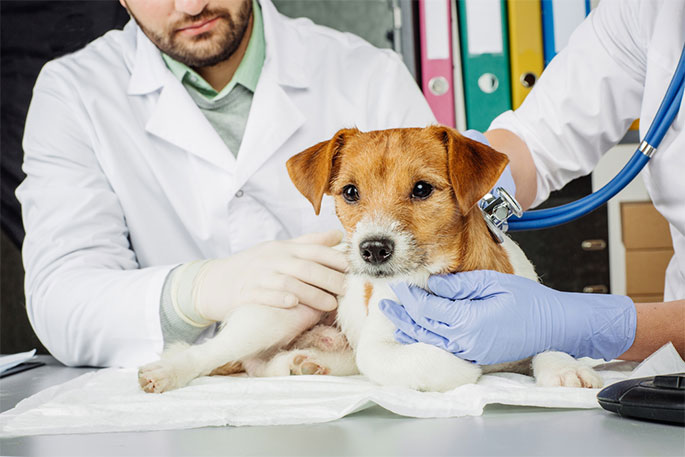
Dogs are man’s best friend. They are the loving companions that bring so much joy and happiness in your life. But it is equally important to give them a healthy, secure experience. As a dog owner, you have to be aware that your dog may develop some health issues. You will need to be mindful of the causes and treatments to deal with these problems.
Below I will discuss one of the more common diseases to affect the dogs, Diarrhea and Vomiting!
Diarrhea: Causes and Treatments
Diarrhea is one of the more common illnesses to affect dogs. There might be quite a few factors to cause this, and there are also some easy remedies for you to try out. Read on below to know more.
Top 10 Causes of Diarrhea
- Direct food replacement: Introducing a new dog food of different brands or feeding high-fat food can easily cause Diarrhea or vomiting.
[Treatment] You can do fasting treatment early, waiting for the dog to recover. Then try feeding some easily digestible food, and wait for the later full recovery. It is recommended that the replacement time of the new and old dog food is 7 days to allow the dog to adapt to the new dog food. Or you can ask a vet online for more guidance into how to approach this issue.
2. Food allergies/food intolerance: Your dog may be allergic to a specific type of food, or it may be unable to digest and absorb particular foods, such as milk or gluten. Diarrhea attacks related to food allergies or intolerance to a specific food are relatively sudden and sometimes accompanied by an increase in exhaust volume.
Treatment: The best way to deal with this is to observe fasting until it recovers partially and find out more about your dog’s allergies and intolerance to different types of food before introducing something new.
3. Intestinal parasites: Your dog might get infected with different types of parasites such as roundworm, hookworm, coccidia, whipworm, tapeworm, etc.
Roundworms: This particular parasite may cause weight loss, malnutrition, anemia, rough coat, dullness, loss of appetite, vomiting, Diarrhea, heterophilia, etc. in your dog.
Hookworms: If your dog gets infected with hookworms, it may show weight loss, dehydration, malnutrition, and loss of appetite. This condition’s typical symptom is the discharge of bloody stool, which is black, brown, or tarry.
Whipworm: This parasite will cause weight loss, nausea, mental and loss of appetite, malnutrition, anemia, bloody stool, or black, tarry in your dog.
Coccidia: bloody stools, anemia, general weakness, dehydration, watery Diarrhea, loss of appetite, indigestion are the standard conditions if affected by this parasite.
Tapeworms: Tapeworms are giant intestinal parasites of many species that can cause malnutrition, weight loss, anemia, gastrointestinal symptoms, and neurological symptoms in dogs. Infected dogs are generally asymptomatic, but hemorrhagic enteritis can be caused when many parasites are parasitic. When pregnancy tablets are detached from the worm body and discharged from the anus, the infected dogs rub their bottom on the ground due to itching of the anus, and sometimes the tail root hair is seen. Intermediate hosts of Taenia canis are various fleas and lice. When fleas appear on dogs, you need to pay attention to deworming their bodies and decontaminate the surrounding environment.
[Treatment] The symptoms of different parasites are different. It is recommended to go to the hospital for related examinations, such as fecal examination, to determine what the parasite is. After the parasite is identified, your vet will advise you on which anthelmintic treatment needs to be performed and how to disinfect the environment.
4. Overeating: Dogs usually have a good appetite and eat a lot of food. So you must control the amount of food you give it. The packaging of the dog food will provide you with a useful reference as to how much you have to feed it, or you can judge according to the softness of the dog’s feces.
[Treatment] When Diarrhea caused by overfeeding occurs in dogs, do fasting treatment first and feed them with probiotics. After returning to normal in the later period, give digestible liquid food first, and then slowly move on to dry dog food. Be aware of the amount of feeding you are giving the dog daily.
5. Ingestion of garbage: Dogs are known to turn over the trash bins at home and rummage through the trash, eating many things they are not supposed to. Eating junk is a known factor for Diarrhea in dogs.
【Treatment】For Diarrhea caused by eating garbage, you can try the fasting treatment, feed probiotics, and take preventive measures, so the dog doesn’t get to turn over the trash can and eat the garbage.
6. Bacterial infections: Many bacteria can affect your dog and cause it to become sick. Salmonella, E. coli, Clostridium, Campylobacter, are a few to name.
[Treatment] You need to make the proper diagnosis and determine the cause first. Various treatments need to be taken depending on the symptom of your dog. Consult your vet for treatment plans.
7. Infectious diseases(small / canine plague / coronal)
Tiny: Acute infectious diseases characterized by enteritis and myocarditis caused by parvoviruses, with rapid onset and high mortality, frequently occur in puppies 3-6 months. The symptoms of enteritis or myocarditis often manifest the occurrence of this disease.
Main symptoms: Incubation period of 1-2 weeks, increased body temperature at the beginning of the disease, loss of appetite or abolition, followed by vomiting, Diarrhea, fecal thin and foul odor, severe Diarrhea is sprayed, feces are yellow or grayish-yellow, mixed with a lot of mucus or Pseudo-membrane. Post-bleeding stool, like tomato juice or ketchup, with special smell. The affected dog will lose weight quickly, the body will be dehydrated, the eye sockets will sink, the skin will get dry and dull, and the elasticity will be decreased. The dog might also get mentally retarded.
False positives will appear on the small test board, and the diagnosis will be confirmed by combining the test results and the dog’s clinical symptoms. Dogs who have just arrived at home can do an infectious disease test and wait a few days before doing it again. For dogs who have just been vaccinated (within 5 days of vaccination), if they are tested for infectious diseases at this time, they may not be allowed because of drug interference.
Canine distemper: incubation period 3-7 days, increased body temperature at the beginning of the disease, 39.5-41 ° C, loss of appetite, poor spirit, watery discharge from eyes and nose, sneezing, or mild cough, occasional diarrhea symptoms, symptoms cold. After 3-5 days, the symptoms will ease, the body temperature will return to normal, and then the body temperature may rise again, which could last for several days or weeks, with depression, anorexia and even loss of appetite. Most of the affected dogs showed a gradual loss of appetite, picky eating, vomiting, reddish urine, loose stools or sticky black or drainage-like odorous feces, mixed with mucus or blood. They might also display additional symptoms such as Increased cough, runny nose or purulent nasal discharge, difficulty breathing, weight loss, dehydration, dry and dull coat, visible flushing or cyanosis of the mucous membranes, conjunctivitis or keratitis in both eyes, mucous or purulent eyes, occasional cornea Ulcers or perforations, dry nose to scab.
Coronary: This disease is an infectious disease caused by a canine coronavirus and characterized by dog vomiting and Diarrhea and sudden death. Fatal Diarrhea is often present in clinics, with a high mortality rate.
Differential diagnosis: The incubation period is 1-3 days, sudden onset, depression, loss of appetite, vomiting, discharge of soft or watery feces, mixed with mucus or blood. Vomiting occurs severely before Diarrhea, and the body temperature rises. After Diarrhea occurs, the body temperature is normal or slightly lower. The body quickly dehydrates, declines in physique, and loses weight. Acute puppies die within 24-36h, and tolerant ones can recover within 7-10d; adult mortality is low. It has gastroenteritis. The intestinal wall is thin, the intestinal cavity is dilated, the intestinal mucosa is filled with white or yellow-green liquid, and the intestinal mucosa is congested, bleeding, and shedding—swollen lymph nodes in the intestinal mucosa.
[Treatment] Immediate symptomatic treatment is required for the dog after being diagnosed with this disease.
8. Poisoning: Your dog may ingest poison inadvertently. Types of poisoning may be heavy metal poisoning (arsenic, lead, zinc), pesticide/drug poisoning (zinc phosphide, benzodiazepine, organophosphorus pesticide), food poisoning, onion poisoning, etc.
Food poisoning: The affected dogs eat too much moldy food, which can cause digestive disorders, gastrointestinal inflammation, and neurological dysfunction. The main manifestations are loss of appetite or abolition, irregular body temperature, rapid heartbeat, shortness of breath, vomiting, Diarrhea, and abdominal pain. Feces are soft and have pathological products, and severe cases have acute gastroenteritis or hemorrhagic gastroenteritis.
[Treatment] Determine the cause of poisoning and treat it symptomatically.
9. Gastroenteritis: This is clinically characterized by digestive disorders, abdominal pain, Diarrhea, fever, and rapid dehydration.
Factors causing this condition include daily feeding management problems (feeding on spoiled or contaminated food); strong irritating drugs; decreased body resistance, overwork, wind chills causing gastrointestinal dysfunction; abuse of antibiotics. Secondary factors are certain infectious and bacterial diseases, Parasites, certain minerals, vitamin deficiency, etc.
[Treatment] When the dog has Diarrhea, it is necessary to control the diet at the beginning of the illness. The etiology of enteritis is very complicated and should be treated according to symptoms. After the later recovery, feed some digestible food. Strengthen feeding management, and food should be fresh and hygienic, it is strictly forbidden to provide spoiled or unclean food, deworming must be done in time.
10. Weather and temperature changes: Some dogs can get Diarrhea with no foreseeable cause. If the above factors are not diagnosed, Diarrhea may be related to the changes in weather. Observe the recent weather conditions, especially on days when the air humidity is high during rainy or snowy weather.
[Treatment] If Diarrhea occurs due to weather changes and is not very serious, pay attention to keeping warm and feeding probiotics. Wait until the dog returns to normal before feeding.
Causes of vomiting
- Direct grain replacement
- Food allergy/food intolerance
- Infectious diseases
- Parasitic diseases
- Toxic diseases
- Gastritis: mainly manifested as vomiting, abdominal pain, and depression. Suffering from vomiting at the beginning of dog disease, containing foamy mucus or gastric juice, sometimes mixed with blood, pus or flocs, or foreign body and tissue fragments. Loss of appetite, like squats or lying on a cold floor, weight loss, weight loss, dehydration. Some cases have nothing to do with feeding. When conditions permit, X-ray angiography and endoscopy can be used to confirm the diagnosis.
- Pancreatitis: mainly manifested as anorexia (less eating), depression (less active activities), obvious dehydration, vomiting, Diarrhea, increased defecation, etc. Pancreatitis is divided into acute and chronic. At present, the more common reason is that animals eat a lot of high-fat and high-protein meat foods in a short period of time. At this time, the burden of the pancreas is too heavy, which will cause pancreatitis. Low-fat, high-protein foods are good for dogs.
- Pharyngitis: vomiting is not severe, or dry vomiting occurs mostly during feeding or swallowing. The main manifestations are head and neck extension, difficulty swallowing, and salivation. When the pain is severe, the dog will refuse to drink water and feed; it’s head movement will be inflexible, the pharynx will be swollen, hot, and sensitive. Stomatological examination revealed flushing and swelling of the soft palate and tonsils. In severe cases, there is also an increase in body temperature. Coughing often occurs with laryngitis.
- Intragastric foreign body: According to the characteristics and size of the foreign body in the affected dog, the clinical symptoms are different. When the foreign body is large or irritating, it is often accompanied by symptoms of gastritis: stomach tenderness, weight loss, intermittent vomiting, occasionally bulimia, and abdominal pain. When conditions permit, X-ray photography and B-ultrasound can be done to help diagnose the condition.
- Intussusception: There are many causes of intussusception, such as seasonal exchanges, environmental changes, dietary changes, viral or bacterial infections, parasites, etc. Symptoms can be Intestinal obstruction symptoms such as loss of appetite, vomiting, viscous bloody constipation, abdominal pain, etc.
- Other vomiting diseases:
- Concussion, brain contusion, and intracranial hemorrhage caused by trauma all have symptoms of vomiting, but they also have different symptoms. Certain infectious diseases can cause vomiting, such as canine distemper, canine parvovirus, feline leukopenia, rotavirus infection, salmonella, leptospirosis, rickettsial disease, coccidiosis, etc.
- Acute poisoning can cause vomiting, and it is found in the medical history investigation that it is often related to feeding and poison, even in vomit.
- Esophageal foreign body, esophagitis, gastroesophageal intussusception, foreign body in the small intestine, intestinal obstruction.
Whatever factors are responsible for Diarrhea or vomiting in your dog, you need to first diagnose the reason for it and consult with your vet to determine and follow the right treatment. After administering the proper symptomatic treatment, your do will get better and return to being the healthy and happy companion you treasure.



